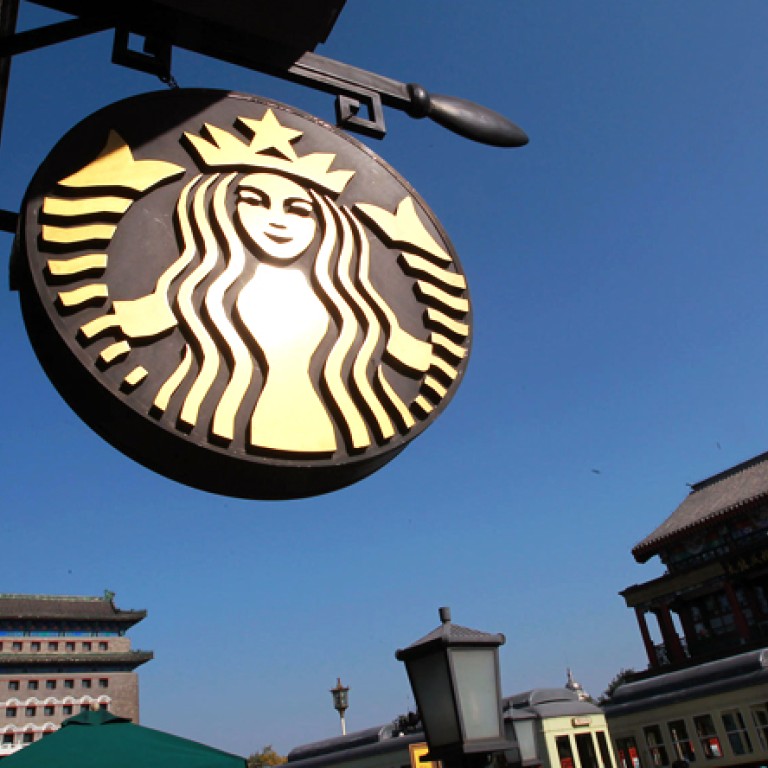
Shots at foreign companies backfire on state network
CCTV's critical reports on popular overseas brands have only strengthened public feeling broadcaster doesn't speak for them
From Apple to Samsung, Danone to Starbucks, CCTV has taken aim at a number of foreign brands this year.
In most cases, the broadcaster attracted more public ridicule over the reports than support, suggesting state media does not enjoy as much credibility as it might hope. But viewer backlash is unlikely to deter the broadcaster from keeping up its campaign, media experts say.
The latest outcry came after CCTV accused Starbucks of profiteering on the mainland by charging more for its coffee than it did in other countries. Many members of the public rallied to the company's defence, dismissing the report as lacking financial common sense.
Unusually long lines formed outside some of outlets as people sought to show their disapproval over the report. While many factors drive the stock market, it did not go unnoticed Starbucks' share price rose in the days following the broadcast.
Similarly, Apple's share price climbed 3.3 percentage points in the week after March 15, when CCTV accused the computer company of mistreating Chinese consumers. The rises led cynical web commentators to compare criticism by CCTV as equal to free publicity
"Comparing the price of lattes around the world is not investigative journalism," said David Bandurski, a research associate at the University of Hong Kong's China Media Project. Credibility of state media was so anaemic stories about corporate misbehaviour led viewers to question the messenger more than the message.
"In many cases where the government comes out on one side of a particular issue, you have people on online platforms such as Sina Weibo instinctively taking the other side, ridiculing state media and guessing at the hidden agenda. That's the way media works in China today," Bandurski said.
People have grown wary of CCTV's selective attention to foreign brands, and what they see as a failure to tackle more pressing issues. As one widely circulated Weibo post said: "We have to buy the most expensive housing in the world, drive the most expensive cars in the world, use the most expensive petrol, eat the most unsafe food, enjoy medical care that easily bankrupts a family, and accept expensive and slow internet … [CCTV] ignores all that and comes to tell me the coffee that I drink no more than five times a year is the most expensive coffee in the world?"
Professor Steve Guo Zhongshi, head of the department of journalism at Hong Kong Baptist University, said that while the media should be free to act as a public watchdog, it must anchor accusations against companies with evidence and not conflate opinion with fact.
Bandurski said that to single out Starbucks over its profits in China was hypocritical - airport coffee shops frequently sold their drinks for about 50 yuan (HK$63), nearly double what the Seattle-based chain charged at its mainland outlets.
The brands CCTV attacked shared a few traits, Guo said. They were "in vogue", aimed at young people, and relatively expensive compared to how rival products were priced. Seen as a group, they represent a trendy lifestyle, "and an attack on them becomes an attack on the values they represent".
Guo said he would not speculate on CCTV's motivations, but would not be surprised if the broadcaster achieved the opposite of what it intended.
"CCTV was never very well liked in the first place," Guo said, comparing the effect of the broadcaster bashing products to state censors banning a book.
"Before books are banned, nobody reads them; as soon as they are banned, everybody wants to read them."
While CCTV might be aware of this, it was unlikely to change as a result, Guo said.
"The effect [of CCTV campaigns] doesn't really matter - it is about maintaining its media presence. It is kind of like a parent and child: the parent knows the teenager won't listen and just wants to smoke and stay out all night, but that doesn't mean the parent is going to let that happen or stop talking."
Bandurski said the state broadcaster was entrenched and had a narrowly defined role.
"All media in China, formally, are there for one purpose - namely to serve the party leadership, although commercial and state media act on very different impulses," he said. "State media has very little incentive to change or to respond to its audience."
CCTV did not respond to inquiries by the .

